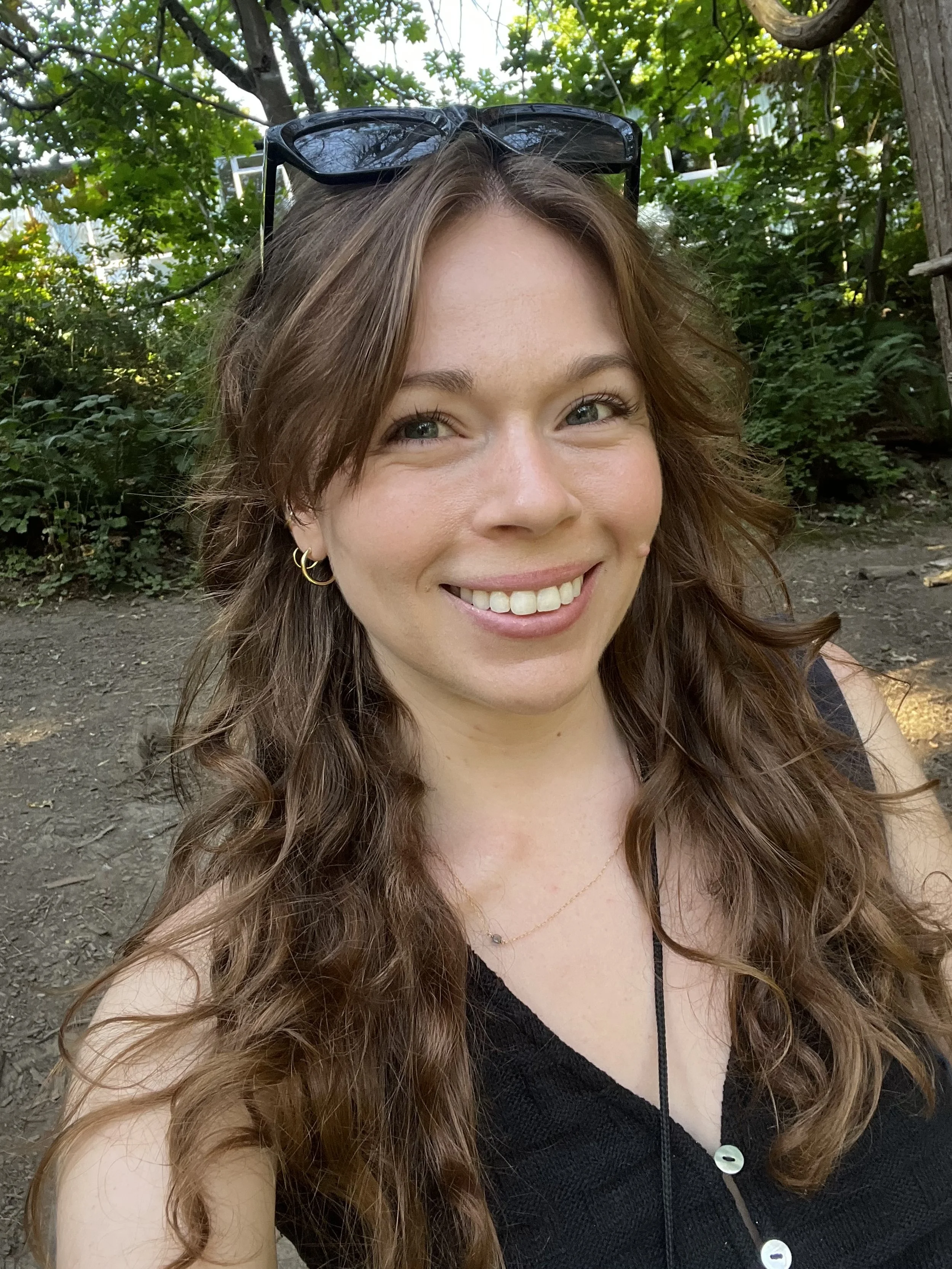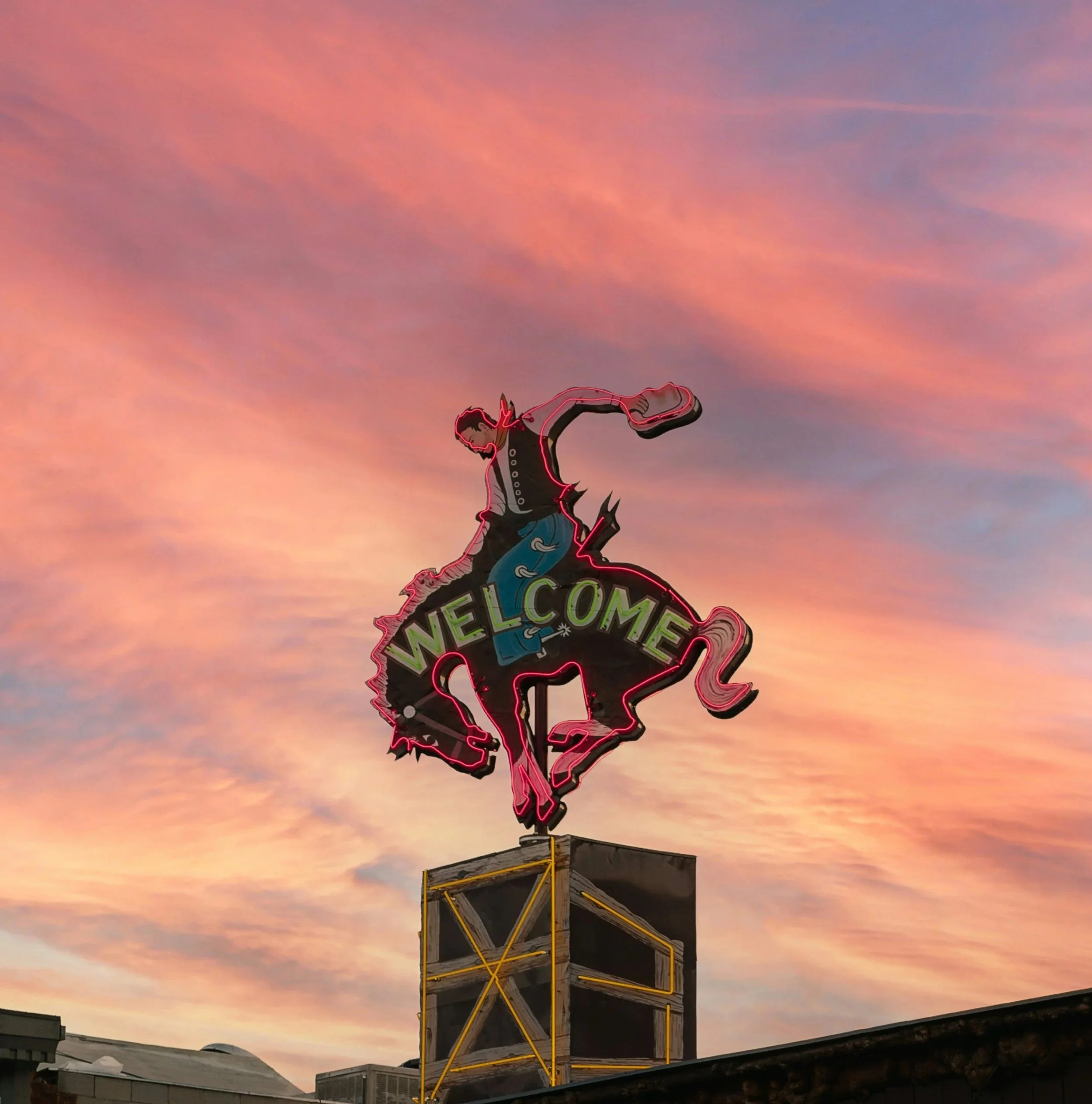To the Bear We Didn't Find

How old was I when we followed you? Six, maybe seven. The memory of tracking you still rises like steam through the cracks of my childhood. It was my father’s idea. We were camping, like we often did, at Standing Indian Campground along the Nantahala River. We awoke in our castle of a tent with two flaps that we zipped up to create rooms: one for my sister and me, and the other for my parents. My father set to work on breakfast over the firepit, feeding fledgling flames. I liked to watch him do this. I would sit on a log beside him and soak in the scent of morning dew and smoke while he cracked eggs into bags of bacon grease to boil over the fire. Then the four of us ate the salty brown scramble that we affectionately called dirty eggs.
My father, sister, and I decided to walk along the edges of the campground to kill time, while my mother read at the campsite. We followed the river upstream to a point where it narrowed, light filtering through the canopy of hemlocks and poplars. My father carried his daypack, already prepped with necessities: water, first aid equipment, a slew of granola bars for whenever my sister or I complained we were too hungry to go on.
“The prints suggested the rhythm of your body, wide and sturdy. I imagined how the drum of your steps would have beat against the grass.”
That is where we saw them: your tracks leading perpendicular to the river. My father leaned down and pressed his finger into the soft earth, assessing the clean outlines; the tracks were fresh. He hopped from rock to rock across the water, never so nimble and confident as when he was river crossing. “Shall we?” he called to us, gesturing to where your prints had recommenced on the other side.
My sister, level-headed and risk-averse, turned back to tell my mother about our silly plan. My father had taught her well—even if he didn’t always follow his own advice—that someone should always know when we were wandering into uncharted woods. But I followed my father, tracing his exact route along the rocks and trusting his footing. I always trusted the path he forged for me.
My father was young, fearless, and a bit reckless, but in the way that came with knowledge and experience. He had spent long summers in the mountains all his life. I don’t believe he ever expected to find you—he had more respect for nature than this scheme suggests. He would never have put me openly in danger, either. He only wanted to explore, to season our wandering with surprises. He was a boy in that way. And I only wanted to follow him, to become part of the stories he told us over the campfire each night.
You were easy to follow, your tracks thick and deep in the damp earth. The prints suggested the rhythm of your body, wide and sturdy. I imagined how the drum of your steps would have beat against the grass. We followed the parallel lines of your tracks. Each crater was a clue. You traveled upward, and so we went up, too, following what was less path than wild incline. My father had taught me never to wander off the trail, just like his father had taught him. But he—both as a child and as an adult—liked to bend the rules, too. He had always been the one to push a boundary, to lead a school-wide prank, to sneak a pet snake into the house, to get a promotion by creating a new role in the company. So, with this same sense of invincibility, he continued to lead the way; the tracks were trail enough for him. Up, up we went chasing our own excitement.
The tracks led us to bushes filled with berries: black or blue or boysen and ripe to eat. We were high enough that the forest had thinned, and I sensed my father’s hesitation. We were maybe too close to you now. He noted a sloped ledge where something slender had made long divots into the soft clay. He conjured you right there. He made a story of you eating those berries just hours before. He made you a female bear, a black bear. He described your great arching back black against the bush, round and firm like a winter pear. He detailed your sloped, wet nose dripping with berry juice.
Then he bent down to the divots. “Deer tracks, Em,” he whispered. “I wonder if the bear snuck up on a deer eating berries here.” He narrated the deer darting up the ledge to flee the sound of snapped sticks beneath your paws, its tracks sliding in its struggle to gain upward traction. I could see it all in the dreamy water color way my imagination worked then. I can see it still. Not the way it happened, but the way my father told it. We were just two kids in the woods playing pretend, him the leader of the production and me his audience of one, making everything he said more real with my belief.
You already know this, but we never found you. That was never the point. The point was that this is how we loved each other: scrambling up rocks, pitching tents, whittling sticks to spear through marshmallows over the fire. At home, my father worked long hours; he’d arrive home just before dinner and scoop me up into his arms. At home, I was my mother’s daughter, riding my bicycle under her watchful gaze. But here, I was his. Here, I took all of him in—his boyish grin, his scent of sweat and smoke, his energetic stride always two steps ahead.
When my father collapsed on the front lawn of our home a few years later and lost his autonomy to a stroke, I saw him caged inside his body, away from the natural world where he raised me. When I replay the memories of our final years camping and hiking together, I find this one most immediate. It is you I see most clearly, whom I return to over and over.
“Let us always be here, safe, our palms pressed against the softness of your prints.”
I apologize for bringing you into this. It’s poor practice to follow a bear. Stupid, really. It’s the kind of thing a man who thinks he can take a bear does. But my father didn’t think this. He only wanted to share an adventure with me.
I’m sorry, too, that over the years, I made many metaphors of you. You became everything my father ever sought: the little mountain home he dreamt of building with four rocking chairs and a wrap-around porch, every hike in his Blue Ridge travel guide he hadn’t yet attempted, his wish to stand with me in front of Maroon Bells’ burnt-orange peaks where he spread his mother’s ashes. You became an escape from the reality of my home-bound father dozing on the couch to Bear Grylls, his body curling over like a hook. You became the father I followed without question who suddenly disappeared. You were not the part of him trapped at home—you were the vanished half of him I kept hoping to find at the end of every trail I traveled without him. You became everything I ached to return to him: possibility itself.
I’d like to stay here in this memory with you a little longer. Let me climb back in and lay my small sneakers against the damp earth. Let me be six or seven calling after my father as he looks for you. Let us always be here, safe, our palms pressed against the softness of your prints.
About the Author
Emily Lowe is a Brooklyn-based writer and editor with an interest in writing about family and mental illness. She holds her MFA from UNCW where she taught creative writing and worked as Fiction Editor for Ecotone Magazine. She is also co-host of The Cusp, a Crown Heights-based reading series that celebrates writers around their birth month. Her work has been published in River Teeth, The Chicago Review, and The Normal School among others. Beyond writing, her other passions include rock climbing, roaming Prospect Park, and cuddling her two complementary colored kittens.
Read Emily’s “Behind the Essay” interview in our newsletter.
Edited by Tusshara Nalakumar Srilatha.
Header photo by Daniele Levis Pelusi.










